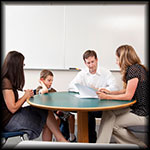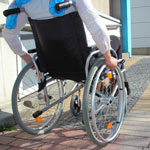Independent & Community Living
INDEPENDENT LIVING
When parents think about their son or daughter making the transition to adulthood, postsecondary education and employment are often the first areas considered. It may be just as important, or more so, to give careful thought to the skills the young person will need to learn, work, and live as independently as possible.
Learning independent living skills in high school leads to more opportunities and greater success after high school graduation. There are many aspects to living independently as a young adult. Starting with the most basic, it’s about having daily living skills, which include grooming and hygiene, personal safety, and knowing how to take care of oneself. In addition, it’s about self-determination – learning to “have a voice and make a choice” about one’s life. These skills are learned over time at home, at school, and in the community. They provide the foundation for what it takes to live meaningful adult lives.
Independent living also means finding appropriate housing, using transportation, managing money, participating in community living – including social and leisure activities – and more. Support needs will vary based on the disability and the unique needs of the individual. A local Center for Independent Living can connect youth and adults with the kinds of supports and services they need.
- Youth in Transition: Independent Living
Watch this 5 minute video and learn what these young people did to prepare for independent living. - Getting Ready for Independent Living at the Age of Majority
This information was developed for families by the National Technical Assistance Center on Transition (NTACT) in collaboration with the Center for Parent Information and Resources (CPIR). - Independent Living Connections
This resource page from CPIR explores the philosophical underpinnings of the independent living movement as well as when to include independent living skill development in the Individualized Education Program (IEP). - Learning Independent Living and Self-Care Skills in High School Lead to Better Post-Secondary Outcomes for Students with Disabilities
This article from NTACT discusses the correlation between students having self-care skills and successful education, employment, and independent living outcomes.

|
Person-Centered PlanningPerson-Centered Planning is a team-based process used to help your youth plan for the future. Focused on your young adult’s personal vision, the team supports and identifies opportunities, relationships, skills and abilities that are required to progress toward achieving the vision. |

|
Self DeterminationSelf-determination means helping youth identify their own goals and dreams, and being able to take charge of making those dreams happen. Parents play an important role in building self-determination within their youth. |

|
Centers for Independent LivingCenters for Independent Living (CILs) are nonprofit community-based programs that are professionally staffed and managed by individuals with disabilities for people with all kinds of disabilities. |
|
|
HousingIt is common for youth to look forward to moving out of the family home and into places of their own. Understanding housing options, available supports, and eligibility criteria can help youth with disabilities and their families work toward a youth’s vision for where they want to live. |


